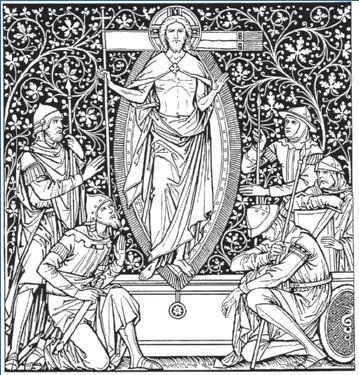My dear folk,
This issue is coming to you a bit late, for which I apologize. For almost two years now, the elephant in the room has been the building restoration project. I don't mean to complain in the least. But let me simply say that as the project nears its end, I long for the time when I can retire my hard hat and go back to being a full-time parish priest.
{grid8}We are so incredibly blessed to be able not only to repair our church building but also to make major improvements. This has been made possible by the generosity of so many: the anonymous foundation who has been our major donor, a half dozen other foundations, neighbors, friends of the parish, extended families of parishioners, and (as is most fitting) an astounding outpouring of enthusiasm and financial support from the parishioners of All Saints' themselves.
I have appreciated your ability to take in stride the changes and challenges which the building work has created. There has been a lot of chaos to cope with, whether it has been dodging the staging in the nave aisles or making due with barely adequate temporary construction lighting. While the central staircase was being demolished and rebuilt we had to go outside to get from one part of the building to the other. The heat went away earlier this spring (demolition began the day after Easter) and did not come back until the second week of November; that meant that we were distinctly cold some Sundays. We dealt with using Porta-Johns while getting to the new restrooms required a walk outside around the block. In short, we were able to keep our eye on the big picture while experiencing inconveniences.
I've often said to you that our tradition presumes an adult membership. We bring our mind as well as our heart to God's house, to his service, and to our response to his commandments. Apparently being a worshipper at All Saints', as least for these last two years, has also presumed a bit of flexibility and dexterity. I am proud of how we have passed through these wilderness years. And I look forward to enjoying this beautiful and holy place as we seek to make known the love of our God.
Turning our attention to the immediate future, we are now in the midst of our season of preparation for Easter. It is Lent once again. Now I have to confess that I have a bit of a "love-hate" relationship with Lent. I know that I am not alone in that reaction. I love the theological themes, the call to repentance, the simplification of the liturgy, the hymnody, even the purple of the vestments. But I also find that I dread its coming: There is a weariness that sets in as the winter wears on, all the more so when the winter is as severe and challenging as this year's. The idea of adding more things to an already hectic schedule is also not high on my list of fun things to do.
Of course, it is possible that part of the hesitance which I find in myself to the Lenten preparations is more subtle and more significant. Perhaps it ultimately is based on the dynamic of repentance and forgiveness. There is an old joke that everybody wants to go to heaven but nobody wants to die. Well, in the same manner, we all want forgiveness of our sins and offenses, the things we have done and those we have left undone. But very few of us are thrilled by having to look at our lives and own those failings. It is so much easier if we can keep it all rather inexact.
I suspect that this is one reason that so many people are adamant about the General Confession of Sin in the liturgy being sufficient and that they do not need to avail themselves of the Sacrament of Penance: we can leave the specific sins out by just using the general terms. We say that we have sinned "in thought, word, and deed, by what we have done, and by what we have left undone." Quite true. But also not specific. We don't have to say, even to our own souls, "I have lied", "I have cheated," "I have hated". I have often wondered how many of us would answer if, after saying the words of the General Confession at Mass, God actually spoke to us and said "Like what? What exactly are you saying you are sorry for?" Do we really know what we are asking to be forgiven for, or is it merely a fuzzy feeling of inadequacy or sinfulness?
This is not to say that use of the General Confession is inadequate, but rather to suggest that the Sacrament of Penance gives a focus and clarity to the great mystery of forgiveness which we are experiencing. The old Anglican rule of "All may, none must, some should" is valid, although I suspect that in our day and in our tradition we ought to put a bit more emphasis on the "some should." (A spikey wag rephrased that slogan to reflect his pastoral experience: "All may, some should, few do.") But whether it be in the general terms of the Mass or in the particularity of the Sacrament of Reconciliation, when we come before God to repent let us know specifically what we are asking him to forgive.
Take some time on Saturday or Sunday morning before coming to church to examine your conscience, to discover the things you've done which you shouldn't have or didn't do and should have. Come earlier to church and make your examination in the quiet before the Mass (that's one reason we encourage there being a reverent quiet before the services). Use the Ten Commandments, or the Seven Deadly Sins, or one of the many aids in devotional books to help guide your reflection. Using such a tool helps keep you from omitting important areas or getting fixated on one or two. (Your clergy are happy to make suggestions of such resources should you need.)
There is a particularity in the sins we commit – specific things we have done or not done. Likewise, there ought to be a particularity to our prayers for forgiveness. A vague feeling of "sinfulness" is simply inadequate. We should know what it is that we are asking God to forgive us for. Doing less than that abdicates our responsibility and makes a mockery of our words.
Yours, in his service,
Michael J. Godderz+
{/grid8}{grid4_last}

{/grid4_last}

